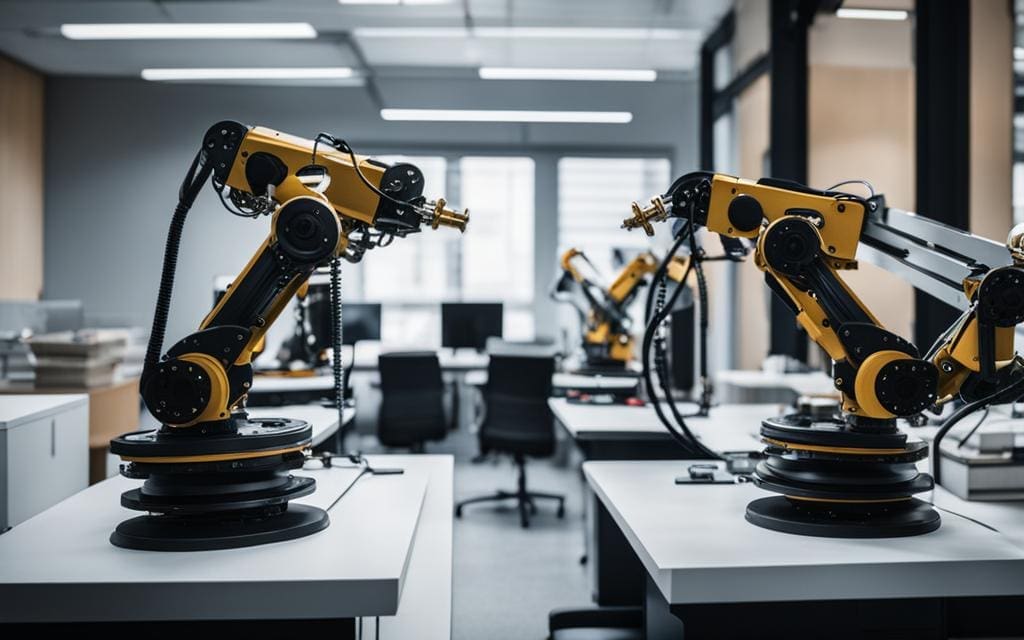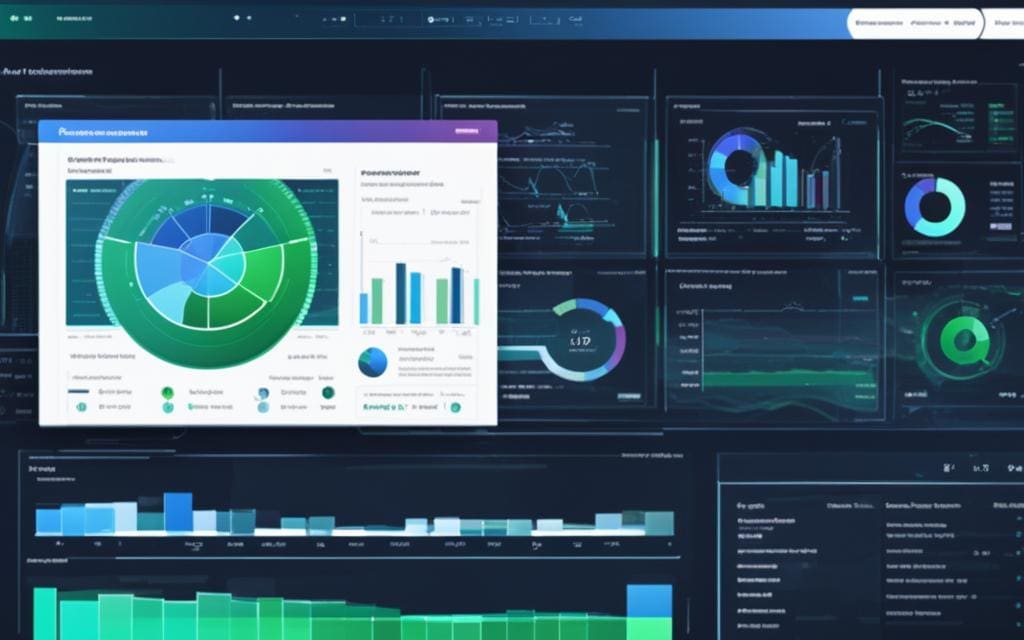Artificial intelligence (AI) is revolutionizing the way we work, offering incredible opportunities to enhance productivity. By leveraging the power of AI, you can optimize work processes, automate repetitive tasks, and make data-driven decisions. In this article, we will explore how AI can transform your productivity and revolutionize the way you work.
Key Takeaways:
- AI for Work Efficiency can automate repetitive tasks, reducing errors and saving time.
- Machine learning enables AI to continuously improve performance, optimizing work processes.
- Cognitive computing enhances efficiency by analyzing complex data and providing valuable insights.
- Productivity tools powered by AI offer smart technology solutions for enhanced efficiency.
- AI-driven work processes can streamline workflows and free up time for more strategic activities.
The Role of AI in Productivity
Artificial Intelligence (AI) plays a pivotal role in boosting productivity by automating tasks, analyzing data, and improving decision-making. With AI-driven automation, businesses can streamline workflows and free up time for more strategic activities. By harnessing the power of AI, organizations can enhance efficiency and achieve greater productivity.
One of the key applications of AI in productivity is through automated processes. AI-driven automation can handle repetitive tasks, such as data entry and scheduling, with precision and speed. This not only reduces the chances of errors, but also allows employees to focus on more complex and creative work. By eliminating manual and mundane tasks, AI helps in optimizing productivity.
Data analysis is another area where AI excels in improving productivity. AI-powered algorithms can analyze large datasets to identify patterns and trends, enabling businesses to make informed decisions. With accurate and timely insights gained from AI data analysis, organizations can optimize processes, identify bottlenecks, and make proactive adjustments to improve productivity.
“AI-powered automation and data analysis are transforming the way businesses operate, unlocking new levels of productivity and efficiency.”
AI also plays a crucial role in decision-making by providing accurate and real-time insights. By analyzing vast amounts of data, AI algorithms can identify correlations and predict outcomes, leading to more informed and strategic decision-making. This enables businesses to prioritize tasks, allocate resources effectively, and make data-driven decisions that drive productivity and growth.
| Benefits of AI in Productivity | Examples |
|---|---|
| Automating repetitive tasks | AI-powered chatbots handling customer queries |
| Efficient data analysis | AI algorithms identifying market trends and customer preferences |
| Improved decision-making | AI-driven insights guiding strategic planning |
AI’s ability to automate tasks, analyze data, and enhance decision-making makes it a vital tool in driving productivity. By leveraging AI technology, businesses can optimize workflows, improve efficiency, and achieve higher levels of productivity.
Automation: Streamlining Repetitive Tasks
Automation is a game-changer when it comes to streamlining repetitive tasks. With the power of artificial intelligence (AI), businesses can leverage technologies like robotic process automation (RPA) and intelligent process automation (IPA) to automate data entry, invoice processing, scheduling, and more. By implementing AI automation, you can significantly reduce the time and effort spent on repetitive tasks, freeing up your employees to focus on more strategic and value-added work.
Robotic process automation (RPA) is a form of AI automation that uses software robots or “bots” to perform rule-based tasks. These bots can navigate through software applications, interact with user interfaces, and mimic human actions. By taking over repetitive tasks, RPA reduces errors and increases efficiency, leading to improved productivity. For example, instead of manually entering data into multiple systems, a software bot can extract the required information from one source and populate it across all relevant platforms, saving time and ensuring accuracy.
Intelligent process automation (IPA) takes automation a step further by combining RPA with machine learning capabilities. This enables the automation of more complex tasks that require decision-making and cognitive abilities. IPA can analyze unstructured data, make predictions, and adapt to changing scenarios. By applying intelligent automation, businesses can streamline processes, improve accuracy, and achieve even greater productivity gains.
“Automation is the key to maximizing productivity. By leveraging AI technologies like RPA and IPA, businesses can eliminate manual and repetitive tasks, allowing employees to focus on higher-value work.” – Industry Expert
Benefits of AI Automation
- Increased efficiency and accuracy: AI automation reduces the risk of human errors and enables faster completion of tasks.
- Cost savings: By automating repetitive tasks, businesses can optimize resource allocation and reduce operational costs.
- Improved employee satisfaction: Removing mundane tasks from employees’ workload can boost morale and job satisfaction.
- Faster turnaround time: AI automation allows for quicker task completion, enabling faster response times and better customer service.
In conclusion, AI automation is a powerful tool for streamlining repetitive tasks and enhancing productivity. By implementing technologies like RPA and IPA, businesses can reduce errors, improve efficiency, and free up valuable time for more strategic initiatives. Embracing automation is key to staying competitive in today’s fast-paced business landscape.
Data Analysis and Predictive Analytics
When it comes to boosting productivity, AI-powered data analysis and predictive analytics play a crucial role. By harnessing the power of artificial intelligence, businesses can analyze large datasets and gain valuable insights that can drive informed decision-making. Machine learning algorithms enable AI to identify patterns and predict trends, empowering organizations to take proactive measures and optimize processes.
AI data analysis goes beyond human capabilities by processing vast amounts of data quickly and accurately. It can uncover hidden correlations, highlight outliers, and identify potential areas for improvement. With AI predictive analytics, businesses can anticipate customer behavior, market trends, and potential risks, enabling them to stay ahead of the competition and make data-driven decisions.
AI-powered data analysis and predictive analytics are revolutionizing industries such as finance, healthcare, and marketing. According to a recent study, companies that harness the power of AI for data analysis achieve on average a 30% increase in productivity. By leveraging AI’s capabilities, businesses can gain a competitive edge and drive growth.
Real-world Applications of AI Data Analysis
The applications of AI data analysis are vast and varied. In finance, AI can analyze market data, detect fraudulent activities, and predict investment opportunities. In healthcare, AI can analyze patient records, identify disease patterns, and provide personalized treatment recommendations. In marketing, AI can analyze consumer behavior, segment customers, and optimize advertising campaigns. These are just a few examples of how AI data analysis is transforming industries and driving productivity.
Benefits of AI Predictive Analytics
AI predictive analytics offers numerous benefits for businesses seeking to enhance productivity. By leveraging AI’s predictive capabilities, organizations can:
- Anticipate customer needs and preferences to deliver personalized experiences
- Optimize inventory management to reduce costs and avoid stockouts
- Identify and mitigate potential risks before they impact the business
- Streamline supply chain operations for improved efficiency
- Identify cross-selling and upselling opportunities to drive revenue growth
With AI predictive analytics, businesses can make data-driven decisions that align with their strategic goals and drive productivity across various functions.
Communication and Collaboration Tools
Effective communication and collaboration are essential for maximizing productivity in the workplace. With the advent of AI-powered communication tools, businesses now have access to advanced technologies that can streamline workflows and enhance collaboration. AI chatbots, for example, are revolutionizing customer service by providing instant responses and 24/7 support. These intelligent virtual assistants can handle a wide range of inquiries, freeing up human resources and ensuring prompt customer satisfaction.
In addition to AI chatbots, AI-enhanced collaboration tools are also making waves in the business world. These tools utilize AI algorithms to track and analyze team performance, identify areas for improvement, and optimize collaboration efforts. By providing valuable insights into productivity metrics, AI-powered collaboration tools enable teams to work smarter and achieve better results.
“The integration of AI-powered communication and collaboration tools has transformed how we work together as a team. The virtual assistants and automated workflows have streamlined our processes, allowing us to focus on high-value tasks and deliver projects more efficiently.”
Furthermore, AI communication and collaboration tools are not limited to internal use within organizations. They can also facilitate seamless communication and collaboration between teams, departments, and even across different companies. By breaking down communication barriers and providing real-time collaboration capabilities, these tools foster innovation and enable businesses to achieve their goals faster.
Table: AI Communication and Collaboration Tools Comparison
| Tool | Key Features | Benefits |
|---|---|---|
| AI Chatbots | Instant responses, 24/7 support | Improved customer service, increased efficiency |
| AI-Enhanced Collaboration Tools | Performance tracking, productivity metrics, real-time collaboration | Optimized team performance, streamlined workflows |
| Cross-Platform Collaboration Tools | Real-time communication, file sharing, project management | Enhanced collaboration across teams, departments, and organizations |
As businesses strive to stay competitive in today’s fast-paced world, the adoption of AI-powered communication and collaboration tools is becoming increasingly crucial. By leveraging these tools, organizations can optimize their workflows, enhance team productivity, and ultimately achieve greater success.
Personal AI Assistants
When it comes to enhancing personal productivity, personal AI assistants like Siri, Alexa, and Google Assistant are game-changers. These AI-powered assistants can perform a wide range of tasks, helping you stay organized and focused on what matters most. By leveraging the capabilities of personal AI assistants, you can optimize your time management and streamline your daily routine.
With personal AI assistants, you can effortlessly manage your calendar, set reminders, and receive proactive notifications about upcoming tasks and appointments. Whether you need to schedule meetings, plan your day, or remember important deadlines, these assistants have got you covered. Their ability to understand natural language commands makes interacting with them intuitive and convenient.
Additionally, personal AI assistants can assist you with various tasks, such as finding information, playing music, setting alarms, and even controlling smart home devices. By delegating these tasks to your AI assistant, you can free up valuable time and focus on more important activities. They provide a seamless integration of technology into your daily life, making your workflow more efficient and productive.
| Personal AI Assistant | Features |
|---|---|
| Siri | – Voice recognition for hands-free control |
| Alexa | – Integration with smart home devices |
| Google Assistant | – Access to a vast knowledge base |
In conclusion, personal AI assistants have revolutionized personal productivity by providing an intuitive and efficient way to manage tasks, organize schedules, and access information. With their help, you can optimize your time management, streamline your daily routine, and unlock your full productivity potential. So, why not take advantage of these powerful AI tools and let them assist you in achieving your goals?
Time Management and Task Prioritization
In today’s fast-paced work environment, effective time management and task prioritization are crucial for maximizing productivity. Artificial intelligence (AI) offers innovative solutions to help you stay organized, make the most of your day, and achieve your goals. By leveraging AI for time management and task prioritization, you can optimize your workflow and enhance your efficiency.
AI-powered apps and tools can analyze your daily routines, suggest optimal schedules, and prioritize tasks based on urgency and importance. These intelligent systems take into account various factors, such as deadlines, dependencies, and your own productivity patterns, to create a customized plan that keeps you on track. With AI’s ability to process large amounts of data quickly and accurately, you can rely on these tools to make informed decisions about how to allocate your time and energy.
Additionally, AI can help you identify and eliminate time-wasting activities. By analyzing your work patterns and identifying bottlenecks, AI can suggest improvements and offer strategies to increase your productivity. Whether it’s reducing time spent on non-essential tasks or automating repetitive processes, AI can provide valuable insights to optimize your workflow.
Benefits of AI for Time Management and Task Prioritization
- Optimized schedules: AI can analyze your calendar, deadlines, and task requirements to suggest the most efficient schedule for your day.
- Improved decision-making: AI considers various factors when prioritizing tasks, helping you make informed decisions about how to allocate your time.
- Time-wasting identification: AI can identify time-wasting activities and suggest strategies for eliminating them, allowing you to focus on what truly matters.
- Automation options: AI-powered automation can streamline repetitive tasks, freeing up your time for more important work.
- Enhanced productivity: By leveraging AI for time management and task prioritization, you can increase your overall productivity and achieve your goals more efficiently.
In summary, AI offers powerful tools and insights to enhance your time management and task prioritization. By leveraging AI-powered apps and automation options, you can optimize your workflow, make informed decisions, and eliminate time-wasting activities. Embrace the power of AI to unlock your full productivity potential and achieve your goals with greater efficiency.
AI in Personal Health and Well-being
The power of AI extends beyond work efficiency and productivity—it can also play a significant role in improving personal health and well-being. With the advent of AI-powered health apps, AI fitness apps, and AI mental health apps, individuals now have access to innovative tools that can enhance their overall well-being.
AI-powered health apps offer personalized fitness plans and tailored workouts based on individual needs and goals. These apps leverage AI algorithms and data analysis to create effective exercise routines that optimize results. Whether you’re looking to lose weight, build muscle, or improve cardiovascular health, AI fitness apps can provide guidance and support every step of the way.
Additionally, AI mental health apps provide valuable resources for managing stress, anxiety, and other mental health challenges. These apps offer features like guided meditations, mood tracking, and cognitive behavioral therapy techniques, all powered by AI technology. By integrating AI into mental health apps, individuals can access therapeutic tools and support whenever they need it, ultimately promoting emotional well-being.
AI-powered health apps and AI mental health apps provide personalized fitness plans and valuable resources for managing mental well-being. With AI technology, individuals can access innovative tools that optimize their physical and emotional health.
Table: Comparison of AI-powered Health and Fitness Apps
| App | Features | Benefits |
|---|---|---|
| AI Fitness App A | Personalized workout plans Real-time exercise tracking Nutrition guidance | Optimized fitness routines Goal achievement Healthy lifestyle habits |
| AI Fitness App B | Virtual personal trainer Workout recommendations Progress monitoring | Motivation and accountability Improved exercise techniques Fitness progress visualization |
| AI Mental Health App A | Guided meditations Mood tracking Progressive muscle relaxation | Stress and anxiety management Emotional well-being support Personalized self-care strategies |
| AI Mental Health App B | Cognitive behavioral therapy techniques Journaling Virtual support groups | Symptom management Emotional resilience enhancement Peer support and connection |
By incorporating these AI-powered apps into your daily routine, you can harness the potential of AI to improve your physical health and mental well-being. Take advantage of the personalized guidance, data-driven insights, and support offered by these apps to optimize your overall wellness and enhance your productivity.
AI Applications in Manufacturing
Artificial intelligence (AI) has rapidly become an essential tool in the manufacturing industry, revolutionizing processes and improving productivity. With AI automation in production lines, businesses can streamline operations, reduce errors, and increase efficiency. AI analytics further enhance productivity by identifying bottlenecks and enabling waste reduction. Let’s explore the various applications of AI in manufacturing and the benefits it brings to the industry.
One of the key areas where AI excels in manufacturing is automation. By implementing AI-driven automation in production lines, businesses can optimize workflows and minimize human error. Machines powered by AI can perform complex tasks with precision and speed, resulting in increased productivity and reduced labor costs. This allows human workers to focus on more strategic activities, such as innovation and problem-solving, further driving efficiency in the manufacturing process.
AI-powered automation in manufacturing can yield significant benefits, such as improved product quality, shorter production cycles, and enhanced overall efficiency. By leveraging AI technologies, manufacturers can optimize their operations and stay competitive in a fast-paced market.
In addition to automation, AI analytics plays a crucial role in waste reduction within the manufacturing industry. By analyzing data from various sources, including sensors and machines, AI algorithms can identify inefficiencies and suggest optimization strategies. This enables manufacturers to minimize waste, whether it be in terms of raw materials, energy consumption, or time. By reducing waste, businesses can increase their profitability and sustainability while also contributing to a more environmentally friendly approach.
| Benefits of AI in Manufacturing | AI Applications |
|---|---|
| Increased productivity and efficiency | AI automation in production lines |
| Reduced errors and improved product quality | AI-driven quality control systems |
| Optimized resource utilization | AI analytics for resource management |
| Enhanced predictive maintenance | AI-powered predictive maintenance systems |
AI is transforming the manufacturing industry by introducing innovative solutions that optimize productivity, reduce costs, and improve overall efficiency. By leveraging AI automation and analytics, manufacturers can stay at the forefront of technological advancements and achieve sustainable growth in the highly competitive market.
AI in Retail and Customer Service
AI is revolutionizing the retail industry, enhancing productivity and efficiency in various ways. One of the key applications of AI in retail is AI demand forecasting. By analyzing historical data and market trends, AI can accurately predict future demand for products. This allows businesses to optimize inventory management, reduce costs, and ensure that they have the right products in stock when customers need them.
Another significant area where AI is making an impact is in customer service. AI-powered chatbots and virtual assistants provide instant assistance to customers, improving response times and overall customer satisfaction. These AI-powered customer service tools can handle a wide range of inquiries, freeing up human agents to focus on more complex issues. Additionally, AI can analyze customer data and provide personalized recommendations, enhancing the shopping experience and increasing sales.
Implementing AI in retail and customer service also brings benefits such as improved operational efficiency. AI can automate routine tasks like inventory management, pricing, and order processing, freeing up employees to focus on more strategic activities. Furthermore, AI analytics can provide valuable insights into customer behavior, allowing businesses to tailor their marketing strategies and product offerings to meet individual needs.
Overall, the integration of AI in retail and customer service is transforming the industry and driving productivity. By leveraging AI demand forecasting, businesses can optimize inventory management and reduce costs. AI-powered customer service tools improve response times and enhance customer experiences. Automation and analytics powered by AI streamline operations and enable businesses to make data-driven decisions. Embracing AI in retail and customer service is key to staying competitive in today’s fast-paced market.
| Benefits of AI in Retail and Customer Service | Examples |
|---|---|
| Improved demand forecasting | – AI algorithms analyze historical data and market trends to accurately predict future demand, optimizing inventory management and reducing costs. |
| Enhanced customer service | – AI-powered chatbots provide instant assistance, improving response times and overall customer satisfaction. |
| Automated routine tasks | – AI can handle inventory management, pricing, and order processing, freeing up employees to focus on strategic activities. |
| Personalized recommendations | – AI can analyze customer data to provide personalized product recommendations, enhancing the shopping experience and increasing sales. |
| Data-driven decision-making | – AI analytics provide valuable insights into customer behavior, enabling businesses to tailor marketing strategies and product offerings. |
Overcoming Challenges in AI Implementation
Implementing artificial intelligence (AI) in your workflow can significantly enhance productivity, but it is not without its challenges. Understanding and addressing these challenges is key to successfully integrating AI into your business processes. Here are some common challenges of AI implementation and strategies for overcoming them:
AI Training and Integration
One of the main challenges in AI implementation is the training and integration of AI systems into existing workflows. AI models often require substantial amounts of data for training, and this data needs to be prepared and labeled appropriately. Additionally, integrating AI systems with existing infrastructure can be complex and require specialized knowledge.
To overcome these challenges, it is crucial to invest in AI training programs for your team and hire experts who can guide the integration process. Partnering with AI solution providers who offer training and support can also be beneficial in overcoming these hurdles.
Adapting AI Solutions
Another challenge is adapting AI solutions to meet evolving needs. As your business changes and grows, your AI systems need to be updated and refined to stay effective. This requires continuous monitoring, evaluation, and adaptation of AI models and algorithms.
To overcome this challenge, it is important to establish a feedback loop with your AI systems and regularly assess their performance. This can involve gathering user feedback, monitoring key metrics, and conducting regular audits to identify areas for improvement. By actively adapting and refining your AI solutions, you can ensure they continue to meet your evolving needs and drive productivity.
Ethical and Privacy Concerns
AI implementation also raises ethical and privacy concerns. The use of AI systems can involve the collection and analysis of sensitive data, which must be handled responsibly and in compliance with relevant regulations. Ensuring privacy and maintaining transparency in AI algorithms is crucial for building trust with users and stakeholders.
To address these concerns, it is essential to establish robust data governance practices and ensure compliance with applicable regulations, such as data protection laws. Implementing ethical guidelines for AI development and usage can also help address concerns related to bias, fairness, and transparency.
By acknowledging and proactively addressing these challenges, businesses can navigate the implementation of AI more effectively and reap the benefits of increased productivity and efficiency.
Conclusion
AI is a powerful tool that can significantly boost productivity in both work and personal life. By harnessing the capabilities of artificial intelligence, you can automate repetitive tasks, analyze data for informed decision-making, and enhance communication and collaboration. The benefits of AI in productivity are immense.
By implementing AI automation in your workflows, you can streamline repetitive tasks, allowing your employees to focus on more strategic work. This not only increases productivity but also improves job satisfaction and engagement. Additionally, AI-powered data analysis and predictive analytics enable you to uncover valuable insights and make proactive decisions, optimizing your processes and driving productivity.
AI-powered communication and collaboration tools, such as chatbots and performance analysis platforms, can transform how your teams work together. These tools enable instant responses, 24/7 customer service, and real-time tracking of progress, ensuring efficient workflows and improved productivity.
Furthermore, AI can also contribute to personal health and well-being, enhancing overall productivity. With AI-powered health apps and fitness apps, individuals can receive personalized fitness plans and wellness guidance, allowing them to stay healthy and energized. Taking care of personal well-being is essential in maintaining high productivity levels.
Embrace the power of AI for work efficiency and unlock your full productivity potential. By utilizing the benefits of AI in various aspects of your work and personal life, you can save time, optimize efficiency, and achieve your goals more effectively.





